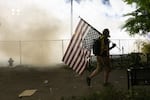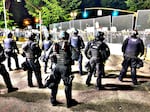Portland leaders and a group of protesters demonstrating against police violence have reached a temporary agreement about police use of tear gas and other crowd control methods.
It's not clear how much the agreement will immediately change the dynamics of the nightly protests between police and thousands who have turned out nightly. The Portland Police Bureau will limit its use of a number of less-lethal devices.
"We'd like something broader, but we're also trying to be realistic," said Ashlee Albies, one of the attorneys representing Don't Shoot Portland, a nonprofit civil rights organization, and also three individual protesters named in a federal lawsuit filed against the city.

A night of protests against police brutality in Portland, Ore., ended with police using tear gas, flash bangs and rubber bullets to disperse the crowd June 5, 2020, after protesters threw water, fruit and bottles at police and then knocked down the fence separating them.
Jonathan Levinson / OPB
"Our goal is to protect protesters and keep them as safe as possible and allow them them to express their First Amendment rights," she said.
Protests in Portland and across the country began in late May, after the death of George Floyd, a Black Minneapolis man who a police officer killed by placing his knee on Floyd’s neck for nearly nine minutes.
Thousands have marched nonviolently in dozens of protests for weeks. Though, many nights have ended with police using a bevy of the "less-lethal munitions" and tear gas to disperse crowds in Portland.
On June 5, protesters filed a lawsuit in federal court against the city over its use of tear gas during demonstrations. Four days later, U.S. District Court Judge Marco Hernandez granted a temporary restraining order.
“The court therefore orders that PPB be restricted from using tear gas or it’s equivalent except as provided by its own rules generally,” Hernandez wrote. “In addition, tear gas use shall be limited to situations in which the lives or safety of the public or the police are at risk.”
The restraining order is in effect until July 24. Since the judge put the order in place, Portland police have used tear gas at least once, though they have used it far less frequently than before.
The protesters and Don't Shoot Portland have since expanded their lawsuit to include other types of less lethal munitions, like the FN 303 riot gun and 40mm launchers.

Police allowed media to view protests from inside law enforcement barriers on Saturday night.
Press pool photo by Devin Eskew/KPTV
The temporary agreement reached Friday applies the restraining order the judge imposed on tear gas to other less-lethal munitions used by police.
The agreement addresses a number of less-lethal weapons used by the Portland Police Bureau for crowd control and dispersal.
The FN 303 is a rifle that shoots a 17 millimeter projectile about the size of a grape. They are designed to shatter on impact so that, in theory, they don’t penetrate the skin. The rounds can deliver paint or OC powder – colloquially known as tear gas. They can also be used to simply inflict pain.
The 40mm launchers fire a foam projectile that, similar to the FN 303, can be used to inflict pain or deliver tear gas.
Both weapons, and weapons like them, are in use across the country and have caused severe injuries and death.
The agreement requires the Portland Police Bureau to follow its existing guidelines and explicitly says impact munitions “shall not be used where people engaged in passive resistance are likely to be subjected to the force.”
That guidance is closely in line with current Portland police directives, which prohibit indiscriminate use of impact munitions and riot control agents. Over the past month, the police bureau has routinely fired FN 303 and 40mm impact rounds into large crowds where only a small number of people were throwing water bottles and other objects.